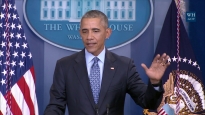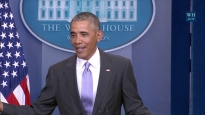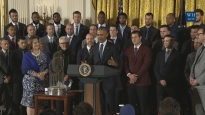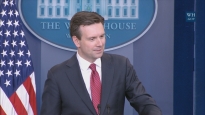President Obama and Nurses Join Together for Reform
September 10, 2009 | 13:54
Following up on his address to Congress, the President addresses a nurses’ event on the White House grounds as they endorse health insurance reform. September 10, 2009. (Public Domain)
Remarks by the President on Health Insurance Reform
THE WHITE HOUSE
Office of the Press Secretary
_________________________________________________________________________
For Immediate Release September 10, 2009
_________________________________________________________________________
For Immediate Release September 10, 2009
REMARKS BY THE PRESIDENT
ON HEALTH INSURANCE REFORM
Room 450
Eisenhower Executive Office Building
Eisenhower Executive Office Building
10:29 A.M. EDT
THE PRESIDENT: All righty. Hey, guys. Thank you. Thank you. Thank you. Thank you so much. It is good to be with all of you -- please sit down, everybody. (Laughter.) It is just great to be with nurses again. It is great to be with Becky. I want to acknowledge -- I want to make sure I get them in order: Naté; this is Linda; and that is Sonia -- right? I got it right? And I want to thank all of them for appearing with us today. And I want to also acknowledge Dr. Mary Wakefield, our Health Resources and Services Administrator, our highest-ranking nurse in the administration. (Applause.)
Thank you, Becky, for your leadership on behalf of nurses. And I want to just thank you for leading an extraordinary organization -- the American Nurses Association. (Applause.) I was mentioning to Becky the first time we met that when I was in the state legislature, I was the chairman of the Health and Human Services Committee. And one of my strongest allies in Springfield, Illinois, in the state capital there, was the Nurses Association, and we did a lot of work together to make sure that nurses were getting treated properly, were getting paid properly, getting the overtime they needed, getting time off that they needed, getting the ratios that they needed.
And so I've got a wonderful history working side by side with all of you to make sure that we've got the best health care system in the world.
And, as a consequence, I want to say thank you for all the support you're providing for health insurance reform for the American people. I am so pleased to be joined by all of you. And I've said it before and I will say it again: I just love nurses. I don't know what it is. (Applause.) I love nurses. Michelle knows about it. It's okay. (Laughter.) I'll never forget how compassionate, how professional, and how dedicated nurses have been to Michelle and I when we needed them most.
And when our daughters were born, one of our best friends was -- is an OBGYN, and she presided over the deliveries. But the truth of the matter is we only saw her for 10 minutes. (Laughter.) That was it. This was one of our best friends. The rest of the time we spent with nurses, who not only eased the nerves of an anxious father, but made sure Michelle was doing all right, cared for our newborn babies.
When our youngest daughter, Sasha, was diagnosed with meningitis when she was just three months old, it was one of the scariest moments of my life. And we had to have a spinal tap administered and she ended up being in the hospital for three or four days. And it was touch and go, we didn't know whether she'd be permanently affected by it. It was the nurses who walked us through what was happening and made sure that Sasha was okay.
So that continues in joy of birth, but also obviously in tougher times. When my mother passed away from cancer, when my grandmother passed away, each time nurses were there to provide extraordinary care, but also extraordinary support. And so I'm thankful for that.
And as a father, and as a son and a grandson, I will forever be in debt to the women and men of your profession. And I know that millions of other families feel the same way. You're the bedrock of our medical profession. You're on the frontlines -- (applause) -- you're on the frontlines of health care in small clinics and in large hospitals, in rural towns and big cities all across this country.
So, few people understand as well as you why today's health care system so badly needs reform. (Applause.) Now, one part of the problem is the uninsured. And this morning, the Census Bureau released new data showing not only that the poverty rate increased last year at the highest rate since the early 1990s, but also that the number of uninsured rose in 2008. And we know from more up-to-date surveys that since the recession intensified last September, the situation has grown worse. Over the last 12 months, it's estimated that the ranks of the uninsured have swelled by nearly 6 million people -- that's 17,000 men and women every single day. And we know that during this period of time, the number of adults who get their coverage at the workplace has dropped by 8 million people.
But I don't have to tell you about all the problems plaguing the health care system, and the fact that they don't just affect the uninsured. Most Americans do have insurance and have never had less security and stability than they do right now. Because they're subject to the whims of health insurance companies, many people fear that they'll lose their health insurance if they move or if they lose their job, they change jobs, or that insurance just won't cover them when they need it the most. Because insurance companies can deny coverage if a person has a preexisting condition, many people fear they won't be covered when they get sick. Because there's no cap on how much a person can pay in out-of-pocket expenses each year, many others fear that a single illness will lead them into financial ruin even if they have insurance.
And I -- every day I get letters from people. I just got a letter two days ago from a woman who had been changing jobs, had just gone to sign up for her new Blue Cross Blue Shield policy, but in January, before she had taken her new job, she had felt a lump and had been referred to do a mammogram and found out unfortunately she had breast cancer. Well, the new insurance policy just said, this is a preexisting condition; won't cover it. She now owes $250,000.
This happens all the time all across the country. You see it every day. It is heartbreaking, it is wrong, and as I said last night, nobody should be treated that way in the United States of America. Nobody. (Applause.)
So the reason I need nurses so badly is because now is the time to act and I will not permit reform to be postponed or imperiled by the usual ideological diversions or -- (applause.) We don't need more partisan distractions. If there are real concerns about any aspect of my plan, let's address them. If there are real differences, let's resolve them. But we have talked this issue to death, year after year, decade after decade. And the time for talk is winding down. The time for bickering has passed. We're not the first generation to take up this cause, but we can -- and have to be -- the last. (Applause.)
So just in case folks weren't tuned in last night -- (laughter) -- if they were watching "So You Think You Can Dance" -- (laughter) -- a show Michelle likes, by the way -- (laughter) -- let me explain -- just explain, more briefly than I did last night, what health insurance reform will mean for ordinary Americans. Simply put, it will mean that as folks go about their everyday lives, one thing they won't have to worry about as much is their health care. It will provide more security and stability to those who have health insurance, it will provide insurance to those who don't, and slow the growth of health care costs for our families, our businesses, and our government.
Now, for the hundreds of millions of Americans who have health insurance, nothing in this plan will require you, or your employer, to change the coverage or the doctor you have. Nothing will change for you if you have insurance. Nothing in the plan will require any changes. What this plan will do is make the insurance you have work better for you; will put in place strong consumer protections that will make it illegal for insurance companies to deny a person coverage on the basis of a preexisting condition. (Applause.)
We will make sure -- we will make sure that we place a limit on how much folks have to pay for out-of-pocket expenses. For the tens of millions of Americans who are uninsured, we'll create a new insurance exchange, a marketplace where uninsured Americans and small businesses can choose health insurance at competitive prices from a different -- a number of different options.
And by pooling the uninsured and small businesses together as one big group, we give insurance companies an incentive to participate and give consumers leverage to bargain for better prices and quality coverage. And as I've said from the outset, and repeated last night, one way to give people a real choice when it comes to their health care and keep insurance companies honest, is by making one of the options available in such a marketplace a non-for-profit public option. (Applause.)
But let me just repeat -- because this is the source of the rumor that we're plotting some government takeover of health care -- it would just be one option among many. No one would be forced to choose it. And everybody believes that the vast majority of people will still be getting their insurance through private insurance.
Add it all up, and the plan I'm proposing will cost around $900 billion over 10 years -- $90 billion a year. That's real money. But it's far less than we've spent on the Iraq and Afghanistan wars. (Applause.) And it's less than the tax cuts for the wealthiest few Americans that Congress passed at the beginning of the previous administration. (Applause.) The cost of this plan will not add to our deficit. The middle class will be rewarded with greater security, not higher taxes. And if we're able to slow the growth of health care costs by just a fraction of 1 percent each year, we will actually reduce the deficit by $4 trillion over the long term.
And by the way, when we stop spending money on things that don't improve quality, then we can start spending money on things that do improve quality -- (applause) -- which means, for example, that we can start paying our nursing professors more money to train more nurses -- (applause) -- so that we can actually have the kind of quality care that we need. Just one example -- a random example that I chose. (Laughter.)
Now, amid all the chatter and the noise on radio and TV, with all the falsehoods that are promoted by not just talk show hosts but sometimes prominent politicians, sometimes it can be easy to lose sight of what the debate over reform is all about. It's about stories like the one told by an oncology nurse named Theresa Brown. A few weeks ago, Theresa wrote a blog post about a patient of hers. He was in his 60s, a recent grandfather, a Steelers fan -- (applause) -- spent the last three months of his life worrying about mounting medical bills.
And she wrote: "My patient thought he had planned well for his health care needs. He just never thought he would wake up one day with a diagnosis of leukemia. But which of us does?" she asked. And then she wrote: "That's why we need health care reform."
Nurses, that's why we need health care reform. I am absolutely confident that if you continue to do your part -- nurses, you guys have a lot of credibility; you touch a lot of people's lives; people trust you -- if you're out there saying it's time for us to act, we need to go ahead and make a change -- if all of us do our parts, not just here in Washington but all across the country, then we will bid farewell to the days when our health care system was a source of worry to families and a drag on our economy, and America will finally join the ranks of every other advanced nation by providing quality, affordable health insurance to all of its citizens. That's our goal. We are going to meet it this year with your help. Thank you very much, everybody. God bless you. (Applause.)
END
10:43 A.M. EDT
10:43 A.M. EDT
|
January 18, 2017
|
January 17, 2017
|
January 16, 2017
|
January 16, 2017
|
|
January 14, 2017
|
January 13, 2017
|
January 13, 2017
|
January 12, 2017
|







